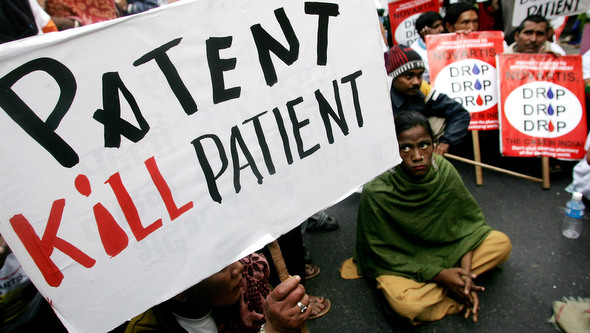He Who Has No Hope That He Shall Reap, Will not Take the Trouble to Sow: A Win for F. Hoffman La Roche
- Jacquelene Mwangi |
- December 4, 2015 |
- Access to Essential Medicines,
- CIPIT Insights

Without the sense of security which property gives, the land would still be uncultivated-Francois Quesnay (1694-1774)
This statement without a doubt reveals the reality as to how much property is arguably the most guarded asset within human beings’ social and legal norms. And the same translates to patent rights of innovators who invest time and money to develop pharmaceutical products. From the view point of a manufacturer, without adequate intellectual property protection, there would be no drugs for mental depression, cancer, HIV/AIDS, heart diseases, erectile dysfunction etc. The patent system allows pharmaceutical companies to profit by creating a somewhat monopoly power, prohibiting any other company from manufacturing, marketing and selling the same product, under the guise that ‘he who has no hope that he shall reap will not take the trouble to sow.’
The importance of commercializing a pharmaceutical patent and preventing infringements from the generic industry, is the underlying reason for eternal legal battles between the ‘strong’ high profile pharmaceutical companies from developed countries and the ‘weak’ generic manufacturers from developing countries.
One such long standing battle is between F Hoffman La Roche Ltd, a Swiss global pharmaceutical company and Cipla Ltd, an Indian global generic manufacturer over a patented cancer drug, Tarceva.
A brief of the case is that Roche obtained a patent for Erlotinib Hydrochloride containing polymorph A & B and marketed under the name Tarceva both in the US and India. Roche later filed for a patent for polymorph B after discovering that it could qualify for enhanced efficacy; the company was able to obtain this patent in the US but not in India as a result of the Indian Patent Act that does not grant patents for products resulting from evergreening. Following media intelligence that Cipla was about to launch a generic version of Tarceva, Roche sought injunction orders, marking the beginning of a technical battle on patent infringement:
-
In 2008, Roche sought interim injunction orders to restrain Cipla from manufacturing, offering for sale, selling and exporting the generic cancer drug Erlocip on grounds that the drug contained similar compounds as its patented drug- Tarceva. In what was largely a win for the generic industry and human rights considerations, the court refused to grant the injunction citing that the right to life of the end users of the life-saving drug was superior to the patent rights of Roche Ltd. On appeal, the court upheld the public interest considerations surrounding Erlocip as a life-saving drug.
-
In substantively determining the matter as to whether a permanent injunction should be granted against Cipla, the court again in 2012 considered the claims under the subject patent and held that from the record, it was not the intention of the plaintiff to cover Polymorph B of the compound within the ambit of the subject patent. Bearing in mind that Cipla was manufactured from Polymorph B, patent which had been rejected in India, it was Cipla’s contention that the compound was not protected, hence being in the public domain. The Court refused to grant a permanent injunction.
-
On appeal, the same question on whether the generic drug Erlocip infringed on Roche’s patent was considered and the chemical compounds of both Erlocip and Tarceva were examined in tandem with the subject patent. On 27th November 2015, the Court set aside the decision dismissing the plea for an injunction against Cipla on a finding that the drug’s manufacture and sale constituted patent infringement. However, due to the fact that the subject patent in India expires in March 2016, the injunction was not granted- it would not be beneficial.
The last say in this long standing battle lies in the recent decision- that Cipla infringed a patent and will have to account for all the profits made. While it is a big win for the pharmaceutical industry and for patent laws generally, what does this mean for access to medicines and the many generic manufacturers involved in promoting access?
It brings to light the difficulties/challenges that legislators and judges have in contemplating the competing public interest issues pertaining to pharmaceutical patents i.e. on the one hand, public interest in ensuring that manufacturers recover costs incurred in research and development and incentivize them to discover more solutions to diseases affecting the human population and on the other hand, public interest in ensuring all people have access to affordable medicines- made possible by generic manufacturers. Complex task indeed!
